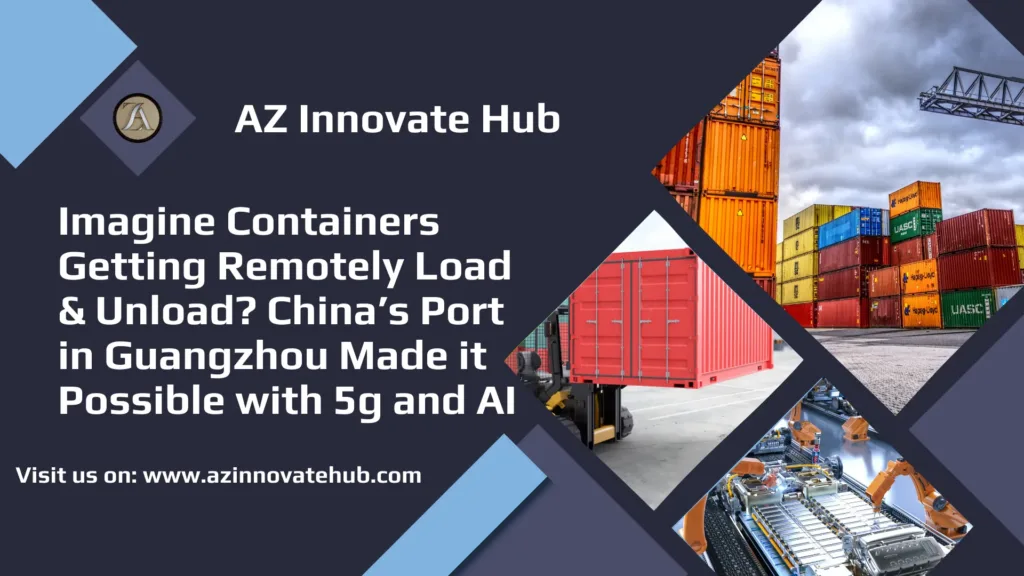
Introduction on Automation
Imagine a bustling port where massive containers are moved with the precision of a surgeon, yet no human hand ever touches them. This is the reality at the Port of Guangzhou in China, where cutting-edge technology such as 5G and Artificial Intelligence (AI) enable automated vehicles to unload containers without any human assistance. But what does this mean for the future of the industry and the people working in it? Let’s dive deeper to see how this groundbreaking technology is reshaping port operations and the benefits it holds for human workers.
The Impact of Automation on the Port Industry
The integration of 5G and AI-powered automated vehicles at the Guangzhou port is a prime example of how automation is revolutionizing industries. With these technologies, the port has experienced a dramatic improvement in efficiency. Containers that use take hours to unload are now handled in a fraction of the time.
According to Port Technology, the automated systems at Guangzhou can process up to 100 containers per hour, a significant boost from the traditional 30-40 containers handled manually. This increase in throughput not only reduces operational costs but also minimized the risk of human error, making operations smoother and safer.
Moreover, these autonomous vehicles operate 24/7 without fatigue, leading to continuous productivity. This non-stop operation is crucial for a port like Guangzhou, one of the busiest in the world, handling over 23 million TEUs (Twenty-foot Equivalent Units) annually.
Benefits for Human Workers
One of the most striking advantages of 5G-driven automation is the ability to allow human operator to work remotely. With the aid of advanced remote-control systems, workers can now supervise and manage operations from a safe distance, reducing their exposure to hazardous conditions.
Additionally, this shift has created new employment opportunities. Roles in remote system management, AI supervision, and equipment maintenance are becoming increasingly popular. This trend helps workers transition into higher-skilled roles, mitigating some concerns associated with the “Automation Paradox.”
Addressing the Automation Paradox
The “Automation Paradox” suggests that while automation can increase efficiency, it may also lead to job displacement. At the Port of Guangzhou, traditional roles such as crane operators or manual loaders may become obsolete. However, this paradox can be addressed through upskilling and re-training programs. By equipping the existing workforce with the knowledge required to handle AI and automated systems, the industry can ensure that employees remain relevant.
In fact, studies have shown that the integration of AI and automation often leads to the creation of more jobs that it replaces. For instance, the International Federation of Robotics noted a 15% increase in employment in sector that adopted automation between 2018 and 2022.
How the Port's Automation is Leading Industry Change
The success of the Port of Guangzhou has set a precedent for other ports around the world. Many are now considering adopting similar technologies to remain competitive. Ports like Rotterdam and Singapore have already started integrating AI and 5G-driven automated vehicles into their operations. This trend indicates a future where automation is no longer an option but a necessity for efficiency and growth.
Furthermore, the port’s automated system is helping alleviate global supply chain issues. With faster and more reliable container handling, delays and backlogs are significantly reduced, benefiting not only the ports but the entire logistics industry.
Conclusion
The use of automated vehicles at the Port of Guangzhou powered by 5G and AI is revolutionizing the port industry. While it brings concerns related to job displacement, it also opens up new opportunities for higher-skilled employment. Addressing the “Automation Paradox” requires a balance – leveraging technology while empowering the human workforce with the necessary skills to thrive alongside these innovations.
Automation at ports like Guangzhou is setting the stage for a new era in logistics, where efficiency and human ingenuity go hand in hand. As more ports embrace this technology, the impact on global trade will be profound, creating a more connected and automated world.
Here’s the video of Automation in Guangzhou Port

